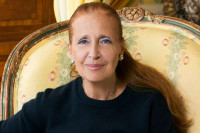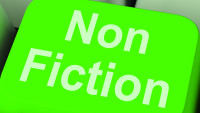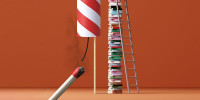
If you're worried about how AI will affect your job, the world of copywriters may offer a glimpse of the future.
bbc.com – Monday June 17, 2024

Writer Benjamin Miller – not his real name – was thriving in early 2023. He led a team of more than 60 writers and editors, publishing blog posts and articles to promote a tech company that packages and resells data on everything from real estate to used cars. "It was really engaging work," Miller says, a chance to flex his creativity and collaborate with experts on a variety of subjects. But one day, Miller's manager told him about a new project. "They wanted to use AI to cut down on costs," he says. (Miller signed a non-disclosure agreement, and asked the BBC to withhold his and the company's name.)
A month later, the business introduced an automated system. Miller's manager would plug a headline for an article into an online form, an AI model would generate an outline based on that title, and Miller would get an alert on his computer. Instead of coming up with their own ideas, his writers would create articles around those outlines, and Miller would do a final edit before the stories were published. Miller only had a few months to adapt before he got news of a second layer of automation. Going forward, ChatGPT would write the articles in their entirety, and most of his team was fired. The few people remaining were left with an even less creative task: editing ChatGPT's subpar text to make it sound more human.
By 2024, the company laid off the rest of Miller's team, and he was alone. "All of a sudden I was just doing everyone's job," Miller says. Every day, he'd open the AI-written documents to fix the robot's formulaic mistakes, churning out the work that used to employ dozens of people.

Did You Know This?
By G. Miki Hayden
Instructor at Writer's Digest University online and private writing coach
firstwriter.com – Monday June 17, 2024

I was thinking about what to tell you from my many years of being in this writing game. Maybe you know a few of the following, or maybe not.
You need a Kindle, though perhaps you already have one. Good. This is important. I bought mine so many years ago I don’t remember the version and I need a new exterior cover. Oh well. The great thing is that these devices last and last.

WRITING TODAY: The Realities of Running a New Playwriting Competition
bbc.com – Sunday June 16, 2024

For the last twelve years I’ve co-run Papatango, a theatre company (and registered charity) devoted to opening pathways into playwriting, especially for people who might otherwise have no access to theatre. My entire working life has coincided with austerity, seemingly bouncing from recession to recession, cutbacks piled on cutbacks, so it’s never been easy – but in the last couple of years, the challenges facing the arts, and the new writing sector especially, have exploded. Ironically – or, perhaps, consequently – our greatest successes have come in this period, notching up Olivier, Critics’ Circle, OffWestEnd and South Bank Sky Arts awards as well as a place in The Stage 25 list of industry leaders. That’s pretty good for a small company with no core funding, making world premieres with little known, often debut, writers. We veer from frowning anxiously over spreadsheets to smiling awkwardly at award ceremonies – but most people only see the successes, not the struggle.
That prompted me to share a transparent account on social media of what it takes to run an open call-out for new writing, and what the pressures and risks are. Despite these, we believe giving voice to new writers is more important in hard times than ever. But if we don’t understand the existential challenge facing such opportunities, we risk losing them. So here it is, an insight into Papatango, warts and all…

Publishing perils: why small isn’t always beautiful
thearticle.com – Sunday June 16, 2024

Sorting through a cupboard beneath the stairs, I discovered that many spare copies of my older books had suffered seriously from damp and would have to be thrown out. A few are salvageable, but not many. Beneath these it looks as if old opera programmes and copies of the Wide World which was edited by my grandfather, Victor Pit-Kethley, will have to meet a similar fate. It is sad, but at least many other copies of my old books were read elsewhere and have probably been better preserved by others around the world.
It has a parallel with a publishing disaster I have suffered in the last year. It is time to analyse what went wrong and see if anything can be salvaged. The main component in this disaster is the overpricing of my book, Washing Amethysts in the Bidet. An expensive printer and a lot of illustrations lay at the heart of this. The text could have stood alone without all the images. I have just checked the prices it is being offered for on various Amazon sites. Currently it is £41.38 in the UK, my chief market, €56.33 in Europe and $36.11 in the US. This is a normal size paperback. It is not a coffee table book. And of course, almost nobody wants to buy at those prices. A friend in Tasmania who was keen to read it found out that it would have cost her about £70 including postage. When I signed the contract a few years ago most of the paperbacks produced by this firm were circa £10. I had no way of knowing this was going to happen. Perhaps pricing is an element that should be covered in literary contracts, but it isn’t.
Across my 45 years or so of writing, my experiences of publishing have been very varied. With the largest publishers there was always a high level of competence. You had regular royalty statements and you got answers to letters or emails. This is not always true of the independents.

Books are my business: Founder of Fish Publishing Clem Cairns
irishexaminer.com – Sunday June 9, 2024

Clem Cairns is the founder of Fish Publishing, which he started with Jula Walton in 1994 with the aim of promoting the work of new writers.
It is based in Durrus, Co Cork, and every year publishes the Fish Anthology, featuring the winners of the Fish short story, short memoir, flash fiction and poetry prizes.
How did you get into publishing?
It is 30 years now since we founded Fish Publishing. I was trying to be a writer and there weren’t that many outlets in Ireland at that time for new writers, particularly for short fiction. Myself and my partner Jula Walton decided we would publish short Irish fiction, and we would do it by running a competition.
That was the initial idea. We called it Fish Publishing because I was working on a fishing trawler out of Schull at the time to earn the money to publish my first book of short stories. It was a good metaphor — casting out a net and hauling in the stories. We wanted to promote and encourage a new generation of Irish writers. After a few years, the internet happened and it went worldwide.

Inside Danielle Steel’s Writing Process: Needing ‘Everything Perfect to Start’ And Why She Still Gets Scared
people.com – Sunday June 9, 2024

Danielle Steel has written 212 books — so far — but the bestselling author still feels the pang of nerves before starting a new draft and the thrill of seeing the finished product on shelves when each publication day rolls around.
"It doesn't get old," she told PEOPLE, for a story in this week's print issue. "I'm always grateful. But also, I'm always scared in the beginning. I never think, 'Oh, I can do this. No big deal.' I'm always scared I won't get it right, or it won't be as good as it should be."
The author says it usually takes about 200 pages before she can really relax, and she strives to make her books "better every time."
Her writing process begins with an outlines she does by hand, accompanied by exhaustive research, much of which she does herself because that attention to detail is what makes her books credible, and keeps her readers coming back.

The surprising joys of independent publishing
thebookseller.com – Monday June 3, 2024

Publishing non-fiction is a tricky beast. I should know, I’ve written five non-fiction books to date with different publishers across the board: Ebury, Transworld, Hodder & Stoughton and each experience has been very different. While I’ve had great experiences (a Sunday Times Business Bestseller, Apple’s "best book of the month", UK book tours, guest curating at Cheltenham Literary Festival, multiple appearances at Hay Festival and other “badges of honour”) I’ve been left wondering if there might a different way to get my zeitgeist non-fiction writing out there. Non-fiction is famously hard to sell (requiring authors to have "a platform") and the books often include timely topics that rely on tapping into a cultural moment. I’ve been thinking: in a world of newsletters and zines — is publishing a traditional big hardback non-fiction book always the best way to spread your idea? I am not so sure anymore.
My Substack newsletter, The Hyphen, has really taken off over the last couple of years and has attracted over 50,000 engaged readers, meaning that I can publish my articles and essays with a click of a button, directly reaching my readers. There is a paid subscription model for any supporters of my work who want to access my hub of over 100+ articles. Even though it’s more about building the community than "scaling" financially or otherwise, I recently made the equivalent of a previous non-fiction book advance in a single month on Substack.

Why Are Debut Novels Failing to Launch?
esquire.com – Thursday May 30, 2024

For first-time writers, it’s harder than ever to break out. That poses an existential crisis for publishing—and disturbing limits on your access to exciting new voices.
On the Road was not Jack Kerouac’s first novel, but you’d be forgiven for thinking as much.
Though 1957’s On the Road is widely considered to be Kerouac’s “debut,” the author’s first novel, The Town and the City, was in fact published in 1950. By all measures, it flopped. Between that book and the launch of On the Road, Kerouac started working with the literary agent Sterling Lord, who believed he could be the voice of his generation and laid the groundwork for his public reception as such. What, exactly, did Sterling Lord do to prime Kerouac’s audience? From 1953 to 1957, he leveraged his own professional connections to place excerpts of On the Road in magazines like The Paris Review and New World Writing, building hype for the young novelist’s next book. This is common practice today, but in the fifties, it was a novel solution to the name-recognition problem faced by unknown writers.
After a few years of seeing Kerouac’s byline in print, the thinking went, readers would pay attention when they recognized his name on the cover of On the Road. It was one of the first literary “debuts” of its kind, explains Temple University professor Laura McGrath, author of the forthcoming book Middlemen: Literary Agents and the Making of Contemporary American Literature. McGrath argues that Sterling Lord created the blueprint for the literary “debut” phenomenon we still see today.

Why do books have chapters? How writing changed from antiquity to children's books and streaming
abc.net.au – Sunday May 26, 2024

Nicholas Dames remembers the first time he really got thinking about a very obvious but largely invisible writing device.
It was around two decades ago, when he was completing a PhD in English and American literature.
"A friend of mine, who was not an academic, over drinks one night, just blurted out to me, 'why do novels have chapters?'," the Columbia University humanities professor tells ABC RN's Late Night Live.
"I realised I hadn't the faintest clue how to answer that question. It was one of those, 'why is the sky blue' questions."
In the years that followed, Professor Dames returned to this question again and again, so he decided to explore the history of the chapter.
The topic may sound deeply academic, but it's not all laborious details about medieval tomes.
At the heart of this history is how we tell stories.
And from a child's development to an evening on the couch watching Netflix, the chapter affects our lives in many unnoticed ways.

Ursula K. Le Guin on How to Become a Writer
lithub.com – Saturday May 25, 2024

How do you become a writer? Answer: you write.
It’s amazing how much resentment and disgust and evasion this answer can arouse. Even among writers, believe me. It is one of those Horrible Truths one would rather not face.
The most frequent evasive tactic is for the would-be writer to say, But before I have anything to say, I must get experience.
Well, yes; if you want to be a journalist. But I don’t know anything about journalism, I’m talking about fiction. And of course fiction is made out of experience, your whole life from infancy on, everything you’ve thought and done and seen and read and dreamed. But experience isn’t something you go and get—it’s a gift, and the only prerequisite for receiving it is that you be open to it. A closed soul can have the most immense adventures, go through a civil war or a trip to the moon, and have nothing to show for all that “experience”; whereas the open soul can do wonders with nothing. I invite you to meditate on a pair of sisters. Emily and Charlotte. Their life experience was an isolated vicarage in a small, dreary English village, a couple of bad years at a girls’ school, another year or two in Brussels, which is surely the dullest city in all Europe, and a lot of housework. Out of that seething mass of raw, vital, brutal, gutsy Experience they made two of the greatest novels ever written: Jane Eyre and Wuthering Heights.
Get the free newsletter | Submit a news item or article | Get Writers' News for your website





